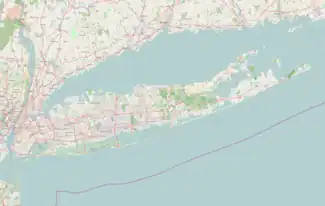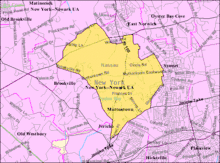Muttontown, New York
Muttontown is a village located within the Town of Oyster Bay in Nassau County, on Long Island, in New York, United States. The population was 3,497 at the 2010 census. it is part of the Greater Oyster Bay area anchored by Oyster Bay.
Muttontown, New York | |
|---|---|
| Incorporated Village of Muttontown | |
 The Muttontown Village Hall Complex in 2021. | |
 Location in Nassau County and the state of New York. | |
 Muttontown, New York Location on Long Island  Muttontown, New York Location within the state of New York | |
| Coordinates: 40°49′20″N 73°31′37″W | |
| Country | |
| State | |
| County | Nassau |
| Town | Oyster Bay |
| Incorporated | 1931 |
| Named for | The area's historic use as a mutton (sheep) pasture |
| Government | |
| • Mayor | James Ligouri |
| • Deputy Mayor | Sudha Prasad |
| Area | |
| • Total | 6.06 sq mi (15.69 km2) |
| • Land | 6.06 sq mi (15.69 km2) |
| • Water | 0.00 sq mi (0.00 km2) |
| Elevation | 285 ft (87 m) |
| Population (2020) | |
| • Total | 3,512 |
| • Density | 579.82/sq mi (223.87/km2) |
| Time zone | UTC-5 (Eastern (EST)) |
| • Summer (DST) | UTC-4 (EDT) |
| Zip Codes | 11545, 11732, 11753, 11771, 11791 |
| Area codes | 516, 363 |
| FIPS code | 36-49330 |
| GNIS feature ID | 0958224 |
| Website | www |
History
The area historically was inhabited my the Matinecock Native Americans, and European colonists began to settle in the area during the 1600s.[2] During colonial times, the area was used to raise sheep for wool and meat.[2]
Muttontown incorporated as a village in 1931.[2] The name of the village stems from its former use as pasturage for sheep.[2]
Zog of Albania bought the local Knollwood Estate in 1951, but sold it in 1955. The Benjamin Moore Estate was listed on the National Register of Historic Places in 1979.[3]
In 2007, a Muttontown couple was arrested after it was discovered that they had enslaved women from Indonesia as house servants.[4][5][6][7][8] The resulting trial saw Varsha and Mahender Sabhnani – the couple – being indicted on federal charges for involuntary servitude and keeping slaves.[7][8][9]
Geography

According to the United States Census Bureau, the village has a total area of 6.1 square miles (16 km2), all land.[10]
The village lost some territory between the 2000 and 2010 censuses to Syosset.[11]
Demographics
| Census | Pop. | Note | %± |
|---|---|---|---|
| 1940 | 335 | — | |
| 1950 | 382 | 14.0% | |
| 1960 | 1,265 | 231.2% | |
| 1970 | 2,081 | 64.5% | |
| 1980 | 2,725 | 30.9% | |
| 1990 | 3,024 | 11.0% | |
| 2000 | 3,412 | 12.8% | |
| 2010 | 3,497 | 2.5% | |
| 2020 | 3,512 | 0.4% | |
| U.S. Decennial Census[12] | |||
As of the census[13] of 2000, there were 3,412 people, 1,022 households, and 920 families residing in the village. The population density was 560.5 inhabitants per square mile (216.4/km2). There were 1,048 housing units at an average density of 172.1 per square mile (66.4/km2). The racial makeup of the village was 79.92% White, 1.82% African American, 16.00% Asian, 0.21% from other races, and 2.05% from two or more races. Hispanic and Latino of any race were 2.29% of the population.
There were 1,022 households, out of which 47.6% had children under the age of 18 living with them, 83.6% were married couples living together, 3.5% had a female householder with no husband present, and 9.9% were non-families. 7.4% of all households were made up of individuals, and 2.5% had someone living alone who was 65 years of age or older. The average household size was 3.34 and the average family size was 3.49.
In the village, the population was spread out, with 29.9% under the age of 18, 5.7% from 18 to 24, 23.4% from 25 to 44, 31.1% from 45 to 64, and 9.8% who were 65 years of age or older. The median age was 40 years. For every 100 females, there were 95.3 males. For every 100 females age 18 and over, there were 91.7 males.
The median income for a household in the village was in excess of $200,000. Males had a median income of $100,000 versus $53,846 for females. The per capita income for the village was $88,020. About 2.0% of families and 3.4% of the population were below the poverty line, including 1.8% of those under age 18 and 4.5% of those age 65 or over.
In 2009, Muttontown was ranked one of the wealthiest towns in America by BusinessWeek.[14]
Education
Muttontown is served by the Jericho Union Free School District, the Locust Valley Central School District, the Oyster Bay–East Norwich Central School District, and the Syosset Central School District.[15] As such, students who attend public schools and reside in Muttontown attend school in one of these four districts depending on where they live in the village.[15]
Notable people
- Alicia Keys, singer/songwriter
- Al Trautwig, sports commentator
- Cliff Josephy, Professional Poker Player
- Lester L. Wolff, former member of the United States House of Representatives from New York
- Chad Pennington, football quarterback[16]
- Jose Reyes, infielder for the New York Mets
References
- "ArcGIS REST Services Directory". United States Census Bureau. Retrieved September 20, 2022.
- Winsche, Richard (October 1, 1999). The History of Nassau County Community Place-Names. Interlaken, New York: Empire State Books. ISBN 978-1557871541.
- "National Register Information System". National Register of Historic Places. National Park Service. March 13, 2009.
- "Opinion | Opening Our Eyes to Slavery". The New York Times. December 23, 2007. ISSN 0362-4331. Retrieved May 28, 2023.
- Vitello, Paul (May 16, 2007). "Couple Held Two Servants Captive for Years, U.S. Says". The New York Times. ISSN 0362-4331. Retrieved May 28, 2023.
- Vitello, Paul (December 3, 2007). "From Stand in Long Island Slavery Case, a Snapshot of a Hidden U.S. Problem". The New York Times. ISSN 0362-4331. Retrieved May 28, 2023.
- Konigsberg, Eric (June 23, 2008). "Couple's Downfall Is Culminating in Sentencing in Long Island Slavery Case". The New York Times. ISSN 0362-4331. Retrieved May 28, 2023.
- "USDOJ: US Attorney's Office - Eastern District of New York". www.justice.gov. Retrieved May 28, 2023.
- Riley, John (March 26, 2010). "'Slave' Case Convictions Stand". Newsday. pp. A26 – via ProQuest.
- "US Gazetteer files: 2010, 2000, and 1990". United States Census Bureau. February 12, 2011. Retrieved April 23, 2011.
- "New York: 2010" (PDF). 2010. p. III-6. Retrieved October 1, 2021.
- "Census of Population and Housing". Census.gov. Retrieved June 4, 2015.
- "U.S. Census website". United States Census Bureau. Retrieved January 31, 2008.
- "The Wealthiest Towns in America: Muttontown, N.Y." p. 15. Part of: Gopal, Prashant (March 17, 2009). "Where the Rich (Still) Live". Bloomberg Businessweek. Retrieved December 29, 2010.
- "Long Island Index: Interactive Map". www.longislandindexmaps.org. Retrieved August 9, 2021.
- Woollard, Deidre. "Chad Pennington in Muttontown, Estate of the Day". Luxist. Retrieved August 27, 2011.